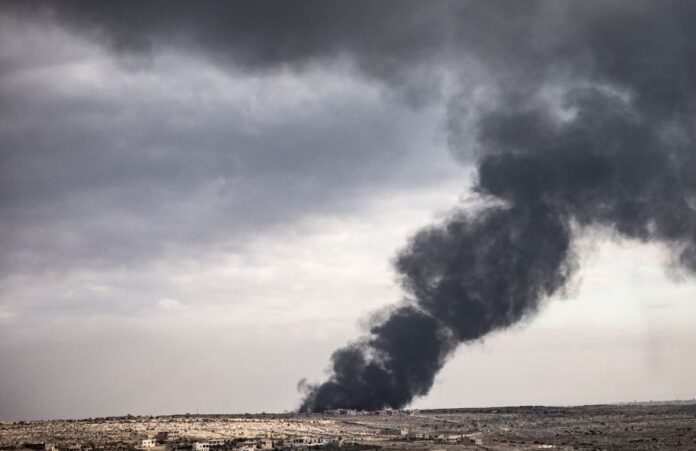DAMASCUS: In a significant setback for the Syrian government, President Bashar al-Assad has reached out to his key allies, seeking bolstered support after the startling loss of Aleppo to Islamist rebels. This unexpected turn of events marks the first time since the onset of the civil war that the city is no longer under Syrian regime control.
The Offensive and Its Aftermath
The offensive began with a coordinated attack by an Islamist-dominated alliance, including the Hayat Tahrir al-Sham (HTS), against government forces on Wednesday, coinciding with a ceasefire in Lebanon between Israel and Hezbollah. According to the Syrian Observatory for Human Rights, the rebels have now taken control of most of Aleppo, with only Kurdish-held areas remaining outside their grasp.
Also Read: Russia Seizes Two Settlements in Donetsk as Offensive Intensifies
Russian air forces, in support of the Syrian government, conducted airstrikes, targeting Idlib and other regions. These strikes resulted in the deaths of at least 12 people in Aleppo and nine civilians in Idlib, as reported by local monitors. The Russian military confirmed their involvement, claiming they were targeting terrorist groups in the provinces of Idlib, Hama, and Aleppo.
Government Response and International Reactions
In response to the crisis, Assad met with Iranian Foreign Minister Abbas Araghchi, who reaffirmed Tehran’s commitment to the Syrian regime. Assad emphasized the importance of allied support in combating what he described as foreign-backed terrorist attacks. Araghchi’s diplomatic itinerary also included stops in Ankara for discussions on the Syrian situation with Turkish officials.
The international community, including the United States, France, Germany, and Britain, has called for de-escalation in Syria, urging protection for civilians and infrastructure, and advocating for a Syrian-led political solution. The U.S., with its military presence in northeast Syria, remains engaged in the region as part of an anti-jihadist effort.
Human Cost and Military Movements
The conflict has escalated with significant civilian casualties, with over 412 people reported dead, including 61 civilians. The Observatory noted that the Syrian army, despite facing little resistance from rebels, has been reinforcing its positions around Hama to the south of Aleppo, indicating preparations for possible counterattacks.
Strategic Implications
Analysts like Aaron Stein from the Foreign Policy Research Institute view the rebel success as a clear sign of the Syrian regime’s weakened state, especially with a reduced Russian military footprint. Aron Lund of Century International has expressed doubts about the government’s ability to reclaim Aleppo without substantial reinforcements from Russia or Iran.
Key Points:
Looking Ahead: The fall of Aleppo to rebel forces not only challenges Assad’s control but also poses significant questions about the future stability of Syria. The ongoing military engagements and the international diplomatic responses will be crucial in determining the next phase of this prolonged conflict.
Loss of Aleppo: For the first time since the Syrian civil war began, Aleppo is out of government control, now held by Islamist rebels including HTS.
- Assad’s Diplomatic Efforts: President Bashar al-Assad has sought support from allies like Iran to counter the rebel offensive, meeting with Iranian Foreign Minister Abbas Araghchi.
- Russian Military Involvement: Russia has conducted airstrikes in support of Syrian government forces, targeting rebel-held areas in Idlib, Hama, and Aleppo, resulting in civilian casualties.
- Casualties: The conflict has led to over 412 deaths, including 61 civilians, highlighting the human cost of the ongoing violence.
- Rebel Advances: Rebels have captured significant territory, including strategic towns like Khan Sheikhun and Maaret al-Numan, with little resistance from the Syrian army.
- Military Reinforcements: The Syrian government has been reinforcing its positions around Hama, suggesting preparations for potential counteroffensives.
- International Calls for De-escalation: The U.S., along with France, Germany, and Britain, has urged for de-escalation, civilian protection, and a political solution aligned with UNSCR 2254.
- Strategic Analysis: Analysts suggest that the fall of Aleppo indicates the Syrian regime’s vulnerability, especially with diminished Russian support on the ground.
- Diplomatic Engagements: Iranian and Turkish diplomatic engagements are underway, with Araghchi visiting both Damascus and Ankara to address the Syrian crisis.
- Humanitarian Impact: The conflict continues to displace residents and cause loss of life, with poignant stories like Umm Mohamed’s daughter-in-law’s death emerging from the chaos.



